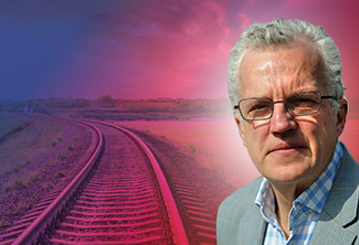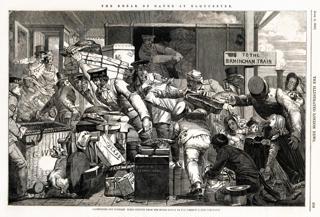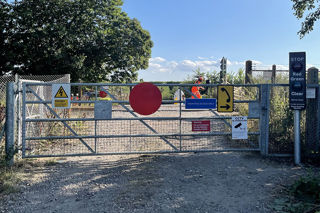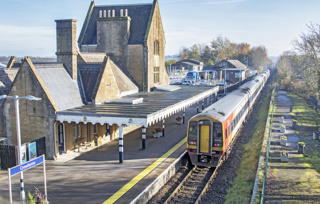The government has placed great emphasis on ‘sorting out the railways’ as a way of showing things can change. And the focus has been on ‘bringing track and train together’ through taking the franchises back in-house.
So far so good. But, as I have pointed out in this column since July’s General Election, that is the start of a process rather than the end. We are supposed to get excited by the creation of Great British Railways, but what will it deliver? A new name and an old logo is what we have so far.
The government has placed great emphasis on ‘sorting out the railways’ as a way of showing things can change. And the focus has been on ‘bringing track and train together’ through taking the franchises back in-house.
So far so good. But, as I have pointed out in this column since July’s General Election, that is the start of a process rather than the end. We are supposed to get excited by the creation of Great British Railways, but what will it deliver? A new name and an old logo is what we have so far.
This seems to be well understood by Transport Secretary Louise Haigh, who in one of her rare public outings spoke at the launch of the Derby Rail Campus to stress that we are entering a new era for the railways.
The campus concept is a clever initiative by the local council to exploit the previous government’s decision to site the headquarters of Great British Railways (GBR) in the city. Certainly, it will do a lot of good for the region, but the public needs to be won over more widely to the change in the structure of the industry.
Haigh’s speech was pretty routine. While clearly endorsing the previous government’s idea to site the HQ of GBR in Derby, she gave no new details of how the system will work.
I asked her afterwards about the role Network Rail would have in the new structure, and she dodged the question by saying it would no longer exist.
She did reiterate the importance of bringing track and train together, and stressed how she was going to be the ‘passenger-in-chief’ rather than the ‘fat controller’. But she mentioned fares reform only as an afterthought in a list of things that needed changing.
That is a shame, because it should be the centrepiece of the railway revolution. After all, what do people care about: getting there safely, quickly and cheaply?
But there is clearly no plan. Everyone agrees that the system is too complicated, that it is incomprehensible, that the peak fare prices are ludicrously high, and that overall, it is a great deterrent to potential users. There is also a debate in the industry between simplification and value for money.
In particular, supporters of retaining key elements of the present system argue that pricing in relation to demand - in other words, cheaper deals for little-used services and premium rates for peak trains - is an essential part of any modern pricing structure.
So, here’s a plan, which I have briefly mentioned before in this column, but has now been elaborated in a bit more detail.
The complexity of the system arises because the original concept of a tariff per mile (which varied between the different Big Four companies that ran the railways before the post-war nationalisation) has been overlaid by a plethora of different types of tickets introduced over decades, such as cheap day returns, advance fares, railcard discounts, and the occasional £1 extra return fare.
Opponents of this complexity argue that the difficulty for passengers in understanding what they are likely to pay for their journey is a great deterrent to train travel.
Indeed, it is difficult not to argue that a return First Class fare of £455 between London and Manchester, and £261 in Standard Class is anything but a massive turn-off for potential customers.
I have just booked a return flight to Japan for £470, which is 4p per mile compared with the fare for that Manchester standard return of 62p per mile. That’s a 15-fold difference that cannot be justified.
My view is that the railways would gain a huge number of passengers if the pricing system was clear and transparent… and those ridiculously high figures were abolished forthwith.
The core of my system is simple. There should be a basic fare, based on an off-peak single for all journeys. This could then be the basis of advertising campaigns and would become widely known. London to Manchester, for example, would then become routinely available at £76 for most journeys.
However, there would be variation according to the time of travel. So, a peak train would be publicised as a +30% or even +50% service for all passengers.
That would guarantee transparency. People would know what they are paying for, and crucially all passengers on the train would pay the same amount. None of this “the bloke next to me paid half the fare I did”.
On the other hand, there would also be cheaper trains at very quiet periods, such as very early morning or late evening. Again, these would be clearly billed as (say) a half-fare train (-50%) or a 30% cheaper train.
The key is to make the system both simpler and consistent. At a stroke, this would do away with cheap advance tickets, split tickets, and a whole plethora of fares.
Moreover, I would suggest that all the railcards are integrated into one, which apparently could have happened some time ago except that one or two train operators were reluctant. But what is the point of having all these different cards which, by and large, offer the same discounts?
The system would be both transparent and flexible. The pricing level for a train or group of trains could be changed.
A big advertising campaign could be made with cheap tickets at its heart, to promote a particular line with an ‘all trains at 50% discount in March’, or whatever. The pricing, therefore, could remain dynamic, but crucially transparent, too.
The concern of politicians and many railway managers is that there will be losers.
Of course there will be, as with any change to the system. But there will also be gainers, and (most crucially) the simplicity will attract people to use rail.
It will take a brave politician to implement such a radical scheme, but it would show that all the upheaval resulting from the creation of Great British Railways would have been worthwhile.
The public needs to be won over to the idea that this government is capable of transforming public services. A brave ticketing reform such as this one would show that it is.
Login to continue reading
Or register with RAIL to keep up-to-date with the latest news, insight and opinion.



















dr bob - 04/12/2024 15:19
"I have just booked a return flight to Japan for £470, which is 4p per mile compared with the fare for that Manchester standard return of 62p per mile. " These comparisons annoy me. I can find a return fare from Manchester to London for tomorrow, returning at the weekend for £102 in first class[1]. I can also find a fare from London to Tokyo in first class for the same dates £21,777.19 [2]. What's your point? Source: [1] splitmyfare.co.uk [2] ANA / Japan Air Lines